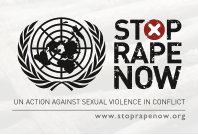UN Action Against Sexual Violence in Conflict

About
UN Action Against Sexual Violence in Conflict (UN Action) unites the work of 12 UN entities with the goal of ending sexual violence in conflict. It is a concerted effort by the UN system to improve coordination and accountability, amplify programming and advocacy, and support national efforts to prevent sexual violence and respond effectively to the needs of survivors.
UN Action member entities
- DPA – UN Department of Political Affairs
- DPKO – UN Dep. of Peacekeeping Operations
- OCHA – UN Office for the Coordination of Humanitarian Affairs
- OHCHR – UN Office of the High Commissioner for Human Rights
- UNAIDS – Joint UN Programme on HIV/AIDS
- UNDP – UN Development Programme
- UNFPA – UN Population Fund
- UNHCR – UN High Commissioner for Refugees
- UNICEF – UN Children’s Fund
- UNIFEM – UN Development Fund for Woman
- WFP –UN World Food Programme
- WHO – UN World Health
Resolution 1820: Women, Peace, and Security
On 19 June 2008, the United Nations Security Council unanimously agreed that sexual violence “when used or commissioned as a tactic of war in order to deliberately target civilians or as a part of a widespread or systematic attack against civilian populations,can significantly exacerbate situations of armed conflict and may impede the restoration of international peace and security,” affirming that “effective steps to prevent and respond to such acts… can significantly contribute to the maintenance of international peace and security”.

United Nations Security Council Resolution 1820 acknowledges that rape can no longer be dismissed as a random byproduct of war, since it is often employed systematically to destabilize, demoralize, terrorize and humiliate communities, forcing many to flee their homes. With Resolution 1820, sexual violence becomes a security issue for the international community, not only a humanitarian and a gender issue. Mass sexual violence threatens the personal security of individuals, as well as the health and security of nations. Resolution 1820 therefore underlines the fact that there is no security without women’s security.
Objectives
- Country Level Action: support joint strategy development and programming by UN Country Teams and Peacekeeping Operations, including building operational and technical capacity.
- Advocating for Action: action to raise public awareness and generate political will to address sexual violence as part of a broader campaign to Stop Rape Now.
- Learning by Doing: creating a knowledge hub on the scale of sexual violence in conflict, and effective responses by the UN and partners.
Cross It
The crossed-arm gesture is being used by the Stop Rape Now campaign, to prevent and respond to conflict-related sexual violence.
The campaign raises awareness about conflict-related sexual violence and invites everybody to get involved and becoming a fan of Security Council Resolution 1820.
The objective is to tell the UN Security Council and governments around the globe that conflict-related sexual violence must and can stop. The campaigns aim is to tell the world leaders that survivors must be able to seek justice, perpetrators must be prosecuted, and that peacekeeping troops, police, and civilian personnel must be trained to prevent sexual violence, and protect and empower women and girls.
Testimonies
“We Congolese women, we are doing what we can to help each other. Women here have long felt neglected-but we hope this feeling will one day be over.”(Testimony of a Congolese woman)– Stephanie Hanes, “Life After Rape in Congo”, Christian Science Monitor, April 25, 2007
“A woman would never go to report a rape to the HNP [Haitian National Police],” said a Haitian woman, “she is likely to be raped by them again.” — Refugees International “RI Bulletin: Haiti: UN Civilian Police Require Executive Authority” (March 14, 2005)
“After my relative declined to give me a job at his shop, I went to a labour market where two men hired me for construction work for 50 Afghani (US $1) a day. They took me into an empty house where they both forcefully had sex with me.”–(statement of 12-year-old boy)-IRIN, “Afghanistan: War, Poverty, and Ignorance fuel sexual abuse of children” (02 June 2007)
See also
- Women, Peace and Security
- Women and peace organisations
- United Nations Security Council Resolution 1325
- United Nations Security Council Resolution 1888
- United Nations Security Council Resolution 1889
Links
- Stop-rape-now website
- Facebook page
- List of NGOs addressing the issue of sexual violence in armed conflict and post-conflict situations
- AIDS, Security & Conflict Research Hub
- Peace Women, Women’s International League for Peace and Freedom


